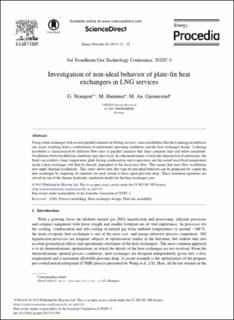Investigation of non-ideal behavior of plate-fin heat exchangers in LNG services
Peer reviewed, Journal article
Published version

View/
Date
2015Metadata
Show full item recordCollections
- Publikasjoner fra CRIStin - SINTEF Energi [1614]
- SINTEF Energi [1730]
Abstract
Using a heat exchanger with several parallel channels in boiling services, static instabilities like the Ledinegg instabilities can occur, resulting from a combination of unfortunate operating conditions and the heat exchanger design. Ledinegg instability is characterized by different flow rates in parallel channels that share common inlet and outlet manifolds. Oscillations between different conditions may also occur. In a thermodynamic system like liquefaction of natural gas, the fluids can exhibit a large temperature glide during condensation and evaporation and the actual local fluid temperature inside a heat exchanger will then be directly dependent of the local mass-flow. This means that mass-flow oscillations also imply thermal oscillations. This study shows how this type of non-ideal behavior can be predicted for a plate-fin heat exchanger by requiring all channels for each stream to have equal pressure drop. These nonlinear equations are solved on top of the thermo-hydraulic simulation model for the heat exchanger core.
